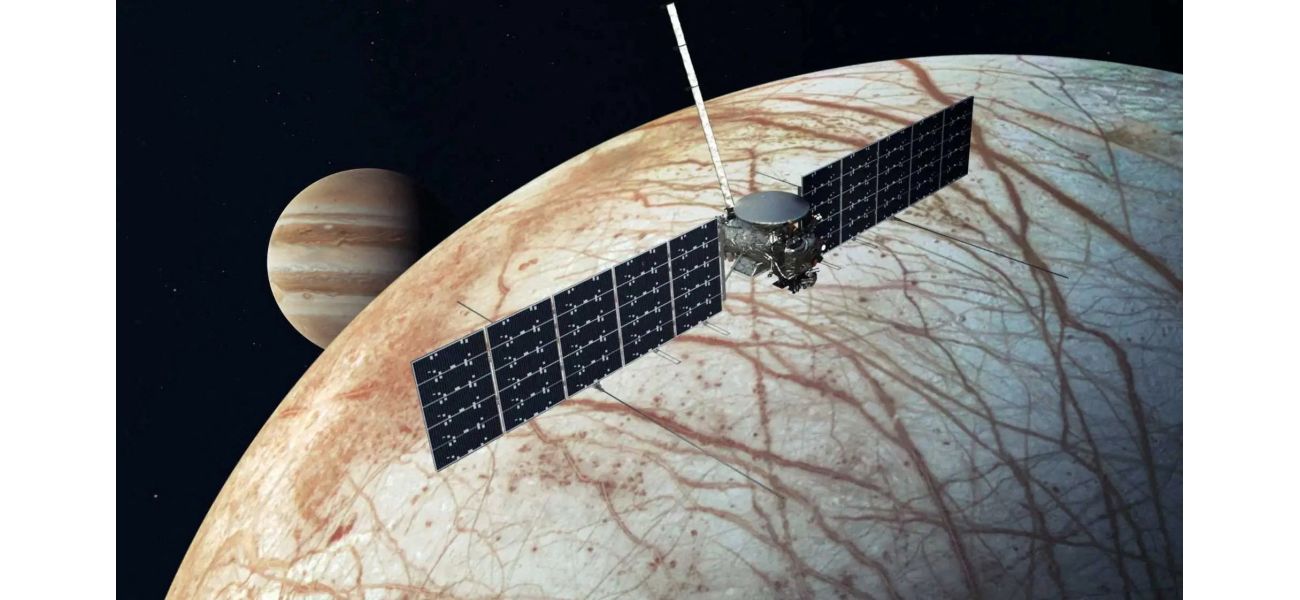Mission to determine if there is extraterrestrial life in our solar system with a costly price tag of £3.8 billion.
A spacecraft will launch at 5.06pm on a 1.8 million mile journey to Jupiter's moon Europa.
October 14th 2024.

For over a century, humans have been fascinated with the idea of discovering alien life. We often think that it must be found in the farthest corners of the universe, light years away from our own planet. However, Nasa, with their extensive knowledge and expertise, believes that the search may be closer to home than we think. In fact, they are launching a rocket this afternoon in an attempt to find it.
At precisely 5:06pm UK time, a spacecraft will embark on a 1.8 billion mile journey through our solar system. Its destination? The largest planet in our solar system, Jupiter, where it will study one of its many moons, Europa. According to Nasa, there is scientific evidence that suggests Europa may currently contain the necessary ingredients for life. While they do not expect to find little green men living beneath its icy surface, they are hopeful that they may discover conditions that could potentially support lifeforms.
The discovery of even the simplest forms of life on Europa would have significant implications. It would suggest that life can form independently in multiple locations within the same solar system. This could mean that life is more common than we once thought and could be found throughout our galaxy and beyond. The mission, known as Europa Clipper, will orbit Jupiter and conduct 49 close flybys of Europa, providing valuable data and insights.
Europa is approximately 90% the size of Earth's moon and is thought to contain more water than our own planet. However, this water is locked underneath thick layers of ice. Within this icy water-world, there could be the necessary building blocks for life. If this is the case, it could indicate that we are not as alone in the universe as we previously believed.
The Europa Clipper spacecraft, which is currently being built and tested at Jet Propulsion Laboratory in California, is estimated to reach its destination in April 2030. This will be a significant moment for scientists as they eagerly await the data it will collect. The launch, originally scheduled for last week, had to be postponed due to Hurricane Milton. Now, conditions are favorable and the craft will be launched today from a SpaceX Falcon Heavy rocket.
Some interesting facts about Europa: its icy shell is believed to be 10 to 15 miles thick and floating on an ocean 40 to 100 miles deep. Despite its smaller size, its ocean may contain twice as much water as Earth's. Europa is also much brighter than our own moon due to the water ice on its surface reflecting over five times the amount of sunlight. However, the surface of Europa is not habitable as it is constantly bombarded by radiation from Jupiter. Scientists believe that the radiation may create fuel for life in an ocean below the surface.
The Europa Clipper spacecraft will not have enough fuel to reach Jupiter on its own. Instead, it will rely on the gravity of Earth and Mars to slingshot it towards its destination before its engines fire up again. This mission is considered one of the most promising in terms of finding potentially habitable environments in our solar system. The spacecraft, equipped with nine instruments and a gravity experiment, will provide valuable insights into the ocean beneath Europa's surface.
If you are interested in watching the launch this afternoon, Nasa will be live streaming it for the public to view. This is an exciting moment for space exploration and the potential discovery of extraterrestrial life. Let's keep our fingers crossed and eagerly await the results from this groundbreaking mission.
At precisely 5:06pm UK time, a spacecraft will embark on a 1.8 billion mile journey through our solar system. Its destination? The largest planet in our solar system, Jupiter, where it will study one of its many moons, Europa. According to Nasa, there is scientific evidence that suggests Europa may currently contain the necessary ingredients for life. While they do not expect to find little green men living beneath its icy surface, they are hopeful that they may discover conditions that could potentially support lifeforms.
The discovery of even the simplest forms of life on Europa would have significant implications. It would suggest that life can form independently in multiple locations within the same solar system. This could mean that life is more common than we once thought and could be found throughout our galaxy and beyond. The mission, known as Europa Clipper, will orbit Jupiter and conduct 49 close flybys of Europa, providing valuable data and insights.
Europa is approximately 90% the size of Earth's moon and is thought to contain more water than our own planet. However, this water is locked underneath thick layers of ice. Within this icy water-world, there could be the necessary building blocks for life. If this is the case, it could indicate that we are not as alone in the universe as we previously believed.
The Europa Clipper spacecraft, which is currently being built and tested at Jet Propulsion Laboratory in California, is estimated to reach its destination in April 2030. This will be a significant moment for scientists as they eagerly await the data it will collect. The launch, originally scheduled for last week, had to be postponed due to Hurricane Milton. Now, conditions are favorable and the craft will be launched today from a SpaceX Falcon Heavy rocket.
Some interesting facts about Europa: its icy shell is believed to be 10 to 15 miles thick and floating on an ocean 40 to 100 miles deep. Despite its smaller size, its ocean may contain twice as much water as Earth's. Europa is also much brighter than our own moon due to the water ice on its surface reflecting over five times the amount of sunlight. However, the surface of Europa is not habitable as it is constantly bombarded by radiation from Jupiter. Scientists believe that the radiation may create fuel for life in an ocean below the surface.
The Europa Clipper spacecraft will not have enough fuel to reach Jupiter on its own. Instead, it will rely on the gravity of Earth and Mars to slingshot it towards its destination before its engines fire up again. This mission is considered one of the most promising in terms of finding potentially habitable environments in our solar system. The spacecraft, equipped with nine instruments and a gravity experiment, will provide valuable insights into the ocean beneath Europa's surface.
If you are interested in watching the launch this afternoon, Nasa will be live streaming it for the public to view. This is an exciting moment for space exploration and the potential discovery of extraterrestrial life. Let's keep our fingers crossed and eagerly await the results from this groundbreaking mission.
[This article has been trending online recently and has been generated with AI. Your feed is customized.]
[Generative AI is experimental.]
0
0
Submit Comment





